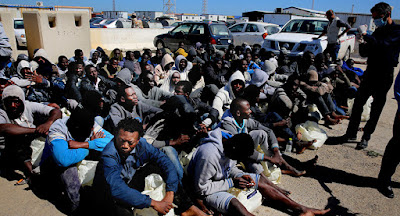Survivors of slave auctions in
Libya have described a "total hell" that they wouldn't wish on their
"worst enemy" as global outrage grows over footage showing migrants
being sold off in the war-torn country.
"We were slaves," said Moussa Sanogo, a migrant
who flew back to Ivory Coast from Libya this week after surviving regular
beatings and forced labour in the fields.
"For the Arabs (Libyan jailers), black-skinned men are
nothing but animals -- animals were treated better," said Sanogo, who
spent more than four months in Libya trying to get to Italy by boat.
The North African country has long been a major transit hub
for migrants trying to reach Europe.
He was just one of those who returned home with stories similar
to those aired last week by US TV network CNN, which showed an apparent slave
auction where black men were presented to North African buyers as potential
farmhands and sold off for as little as $400 (340 euros).
"It was total hell in Libya," said Maxime Ndong,
one of 250 migrants flown back to Cameroon on Tuesday night.
"There is a trade in black people there. People who
want slaves... come to buy them," he told AFP.
"If you resist, they shoot at you. There have been
deaths," said Ndong, who spent eight months in Libya.
The Cameroonians flew back to Yaounde on Tuesday aboard a
plane charted by the International Organization for Migration (IOM) as part of
a project to return and reintegrate some 850 people.
Sanogo, 22, was one of about 600 Ivory Coast migrants that
were returning from Libya with IOM's support. Around 150 people landed in the
capital Abidjan on Monday with the rest to be brought home during the week.
Sanogo described Libya as an anarchic country preyed on by
bandits where the forces of law and order were involved in human trafficking.
"At one point, we were caught by people who said they
were police," he said.
"The police then sold me for 500 dinars (310 euros,
$365) to a man who made me work in a tomato field for a month. You have to work."
Sanogo fled across the desert to Niger where he was
imprisoned again before finally escaping to Tunisia.
Then a people smuggler promising a path to Europe convinced
him to return to Libya.
"We were captured and locked in a small room with 60
other people," and were "not able to wash," he said.
"When the Arabs entered they wore masks due to the
smell," he said, shaking his head at the memory.
"They are buying you. You're there, you have been
arrested, you see they are judging your price like merchandise. They bought you
and you're going to work... like a slave," he said.
"They hit you all the time -- especially if you're big
like me -- until the blood flows, with sticks, metal, the butt of a gun.
"For food, you are given a piece of bread and a piece
of cheese, that's all... I'm happy to be back," he said.
"I would not wish it on my enemy."
Another migrant, Seydou Sanogo from Abidjan, said: "You
would have to see what we lived through to believe it".
But not everyone wanted to leave Libya. One woman with an
18-month-old baby said she did not want to return to Ivory Coast.
"We were waiting for the boat. We were almost
there," said the woman, who did not give her name.
The slave auction footage has triggered an outcry across
Africa, bringing to public consciousness a situation that has previously been
condemned by many non-governmental groups and observers.
Music and football stars have expressed their outrage at the
revelations, including Ivorian reggae singers Alpha Blondy and Tiken Jah
Fakoly, as well as footballer Didier Drogba.
"It is a double indignation, a cry from the heart: I am
shocked to see the children of Africa die... trying to find a better
tomorrow," said A'Salfo, lead singer of the group Magic System.
"A humiliation for Africa."
The United Nations said the slavery auctions should be
investigated as possible crimes against humanity, and the issue will be on
agenda at an African Union-EU summit on November 29 to 30 in Abidjan.
AFP







